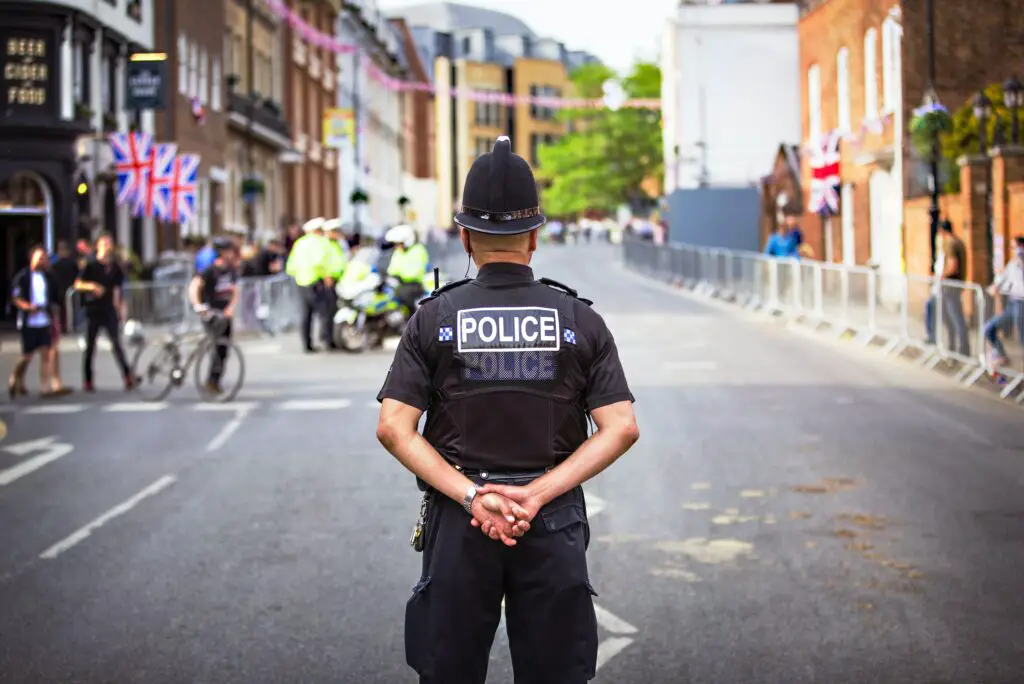Welcome to the Q&A section of my blog. Today I am discussing a distressing neighbour dispute, the question being ‘My neighbour is making false allegations to the police UK, what can I do?’.
Picture this: you lead a responsible life and have always got on with your neighbours and then all of a sudden, your world is turned upside down when your next-door neighbour starts making false allegations against you to the police. What makes it worse is your neighbours are gossiping and spreading rumours.
In this Q&A, we meet Sarah, who has faced the daunting challenge of dealing with baseless accusations from their neighbours. False allegations are not only emotionally draining but can have far-reaching consequences on one’s reputation, mental well-being, and even legal standing.
Whether you’re facing a similar ordeal or seeking knowledge to support a friend, this post aims to provide valuable advice and empower individuals to regain control amidst the chaos.
Question…
My neighbour is making false allegations to the police UK, what can I do?
My name is Sarah, and I live on a nice street in the UK. I’ve always been a law-abiding and responsible individual, but my life has taken an unexpected and distressing turn. My next-door neighbour, Mr Johnson, has been making false allegations against me, and the situation has escalated to him accusing me of criminal damage to his property.
It all began with a noise complaint.
One morning, I was startled when the police showed up at my door, stating they had received a complaint from Mr Johnson. He alleged that I throw loud parties and play blaring music late at night, disturbing the entire neighbourhood.
To my utter disbelief, I explained to the officers that I rarely have visitors, and hardly ever play music, especially not during odd hours. They seemed understanding but warned me that repeated complaints could lead to serious consequences. They also said that the council will be in touch with me about noise pollution if it happens again.
As if the noise complaint wasn’t enough, the situation worsened when Mr Johnson accused me of criminal damage to his property. He claimed that I vandalised his garden fence and damaged his car.
It was surreal to hear such an accusation, as I would never do anything to harm someone else’s property.
Ever since that incident, my life has become a constant source of anxiety and stress.
I’m always on edge, worrying that any slight noise might trigger another false complaint from Mr. Johnson.
It feels like he’s constantly watching my every move, ready to fabricate more baseless reports. The fear of facing legal consequences or being perceived as a nuisance in the neighbourhood haunts me every day.
I don’t even know why my neighbour has started to dislike me or make these false allegations to the police.
I’m unsure of what to do next.
Confronting Mr Johnson directly could escalate the situation further, and I want to avoid any unnecessary conflicts.
Seeking legal help is an option, but I’m not sure if I have enough evidence to prove his allegations are false. It’s disheartening to think that someone can tarnish my reputation and peace of mind without any real justification. I’m also worried about the costs and the potential strain on my finances.
Despite my efforts to maintain a friendly and cooperative relationship with my neighbours, Mr Johnson seems determined to make my life miserable.
I’ve tried to communicate with him, hoping to understand his grievances and address any concerns, but he’s unresponsive and continues to escalate the situation.
I’m reaching out for advice on how to handle this horrible situation. How can I protect myself from these false allegations, particularly the accusation of criminal damage to his property?
What steps can I take to alleviate the stress and anxiety caused by Mr Johnson’s actions?
Any guidance or suggestions would be greatly appreciated. I’m determined to find a resolution that preserves my peace of mind and clears my name from these baseless accusations.
Answer… Advice for Dealing with a Neighbour Making False Allegations to Police UK
I am really sorry to hear what you are going through with your neighbour making false allegations to the police.
Dealing with false allegations from a neighbour can be distressing, but there are steps you can take to protect yourself and legally address the situation.
Here’s some advice on how to handle this situation:
Maintain Composure:
It’s essential to remain calm and composed, even though these false accusations are causing you stress. Avoid any confrontations with your neighbour, as they might exacerbate the situation further.
Document Everything:
Start keeping a detailed record of all interactions with your neighbour, including dates, times, and the nature of the conversations. If there were any witnesses to events or incidents, note their names and contact information. This documentation will be valuable if the situation escalates.
Gather Evidence:
Regarding the criminal damage allegations, take photos of your property and Mr Johnson’s property, (without invading his privacy) to demonstrate that no damage occurred on your part. Having evidence on hand can help refute his claims if needed.
I have a separate blog on how to gather evidence for a neighbour dispute that you can read here.
Set up Video Security:
Set up a video home security / CCTV on your property (front and back), this may capture evidence if either your neighbour damages his own property, or if the damage is caused by someone else.
I would recommend the Eufy home security system or Ring Doorbell for the front door.
Speak to Other Neighbours:
Talk to other neighbours in your area to see if they have experienced similar issues with Mr. Johnson or if they can provide any additional insights.
Their testimonies might support your case if you need to involve the authorities or legal professionals.

Communication and Mediation:
If you feel comfortable doing so, try engaging in open and honest communication with Mr Johnson. Express your desire to maintain a peaceful neighbourhood and find a resolution to any grievances.
If direct communication is difficult, consider seeking the help of a mediator to facilitate a conversation.
I have a separate blog on how to use mediation to resolve neighbour disputes that you can read here.
Police Involvement:
If false allegations continue or escalate, you might need to involve the police.
Present the police with the evidence you have gathered to demonstrate that the allegations are baseless. False reporting to the police is a criminal offence in the UK under Section 5 of the Criminal Law Act 1967.
Consult Legal Advice:
Reach out to a solicitor or a Citizens Advice Bureau for legal advice regarding your situation.
See the sections below regarding harassment and defamation of character laws.
They can guide you on the appropriate actions to take and help you understand the relevant laws and regulations in the UK.
You can get quick and free quotes for solicitors on Bark.com. I have used Bark personally and highly rate it.
Harassment Law:
In the UK, harassment is a criminal offence under the Protection from Harassment Act 1997.
If you feel that Mr Johnson’s actions constitute harassment, consult with legal professionals about potential remedies under this law.
In UK law, harassment is defined as a course of conduct that causes another person to feel distressed, alarmed, or humiliated. Harassment can take various forms, including physical, verbal, non-verbal, or online actions.
I have a separate blog with more details about the Protection from Harassment Act 1997 that you can read here.
Defamation of Character:
Defamation of character can apply in the UK if a neighbour is making false accusations to the police. Defamation in the UK covers both spoken (slander) and written (libel) false statements that harm a person’s reputation.
If a neighbour makes false accusations about you to the police, and those statements are communicated to others, it could potentially meet the criteria for defamation.
To successfully pursue a defamation claim, the following elements generally need to be established:
- Publication: The false statement must have been communicated to at least one other person, apart from the person making the statement and the victim.
- Identification: The statement must refer to the victim or be understood to be about the victim, directly or indirectly.
- Defamatory Content: The statement must be damaging to the reputation of the victim. This means it lowers the victim’s esteem in the eyes of right-thinking members of society.
- Falseness: The statement must be false. Truth is generally considered a defence against defamation claims.
- Harm: The victim must demonstrate that they suffered harm as a result of the false statement, whether it be reputational damage, financial losses, or emotional distress.
Defamation cases can be complex and require evidence to prove the elements listed above. It is essential to seek legal advice from a solicitor who specialises in defamation cases to understand your specific situation and evaluate the potential for a successful claim.
Community Support:
Engage with your local community, neighbourhood watch groups, or residents’ associations. Their support and solidarity can help counter false narratives and provide emotional assistance during this difficult time.
Self-Care:
While dealing with false allegations can be taxing, prioritise self-care and seek support from friends, family, or a counsellor to help you cope with the emotional impact of the situation.
You should also contact your GP if you feel your health is at risk.
I hope this gives you a bit of an action plan if your neighbour is making false accusations to the police in the UK. I really hope you manage to resolve the situation.

What Are The Consequences of False Accusations To The Police?
False accusations can have significant and wide-ranging consequences in the UK.
These consequences can affect both the person who is falsely accused and the person making the false allegations.
Some of the key consequences are as follows:
- Damage to Reputation: False accusations can tarnish the reputation of the person being accused, leading to social stigmatisation and damage to personal and professional relationships.
- Emotional Distress: Being falsely accused can cause severe emotional distress, including anxiety, depression, and feelings of helplessness, as the individual may struggle to cope with the injustice and betrayal.
- Legal Costs: The accused may need to seek legal representation to defend themselves against false allegations, incurring significant financial costs and potential strain on their resources.
- Criminal Record: False criminal allegations can lead to unnecessary involvement with the criminal justice system, and even if proven innocent, the accused may have a record of the allegations, which could impact future employment opportunities or travel.
- Strained Relationships: False accusations can cause strained relationships between the accused and their family, friends, and neighbours, as well as between the accused and the person making the false allegations.
- Loss of Trust: False accusations can erode trust within the community, making it difficult for the accused to feel safe and secure in their neighbourhood.
- Wasted Police Resources: False accusations divert valuable police resources away from genuine cases, potentially delaying responses to real emergencies and crimes.
- Potential Legal Consequences: In the UK, making false accusations to the police is considered a criminal offence under the Criminal Law Act 1967. If found guilty, the accuser may face legal penalties, including fines or imprisonment.
It is essential to recognise the seriousness of false accusations and the impact they can have on individuals’ lives and the community at large. In such cases, it is crucial to handle the situation with care, gather evidence, and seek legal advice to protect one’s rights and reputation while ensuring a fair and just resolution.
Remember, dealing with false allegations requires patience and careful handling. Seek legal advice and follow the appropriate channels to address the issue lawfully and protect your rights.
Final Thoughts About Neighbour Making False Allegations to Police UK
In the face of false allegations from a neighbour, Sarah’s situation has illustrated the impact such accusations can have on one’s life and well-being. From sleepless nights to constant anxiety, the toll is undeniable. However, armed with knowledge and understanding of the law, we can rise above this nightmare and seek justice.
Remember, documentation is your ally; keeping track of interactions and gathering evidence can be crucial in countering baseless claims. Seek legal advice to understand your rights and explore the appropriate channels for resolution. While confrontation might be tempting, pursuing mediation and open communication can lead to peaceful outcomes.
As we conclude this blog post, remember that no one should face false allegations alone. Reach out to friends, family, or professionals for emotional support.





Leave a Reply